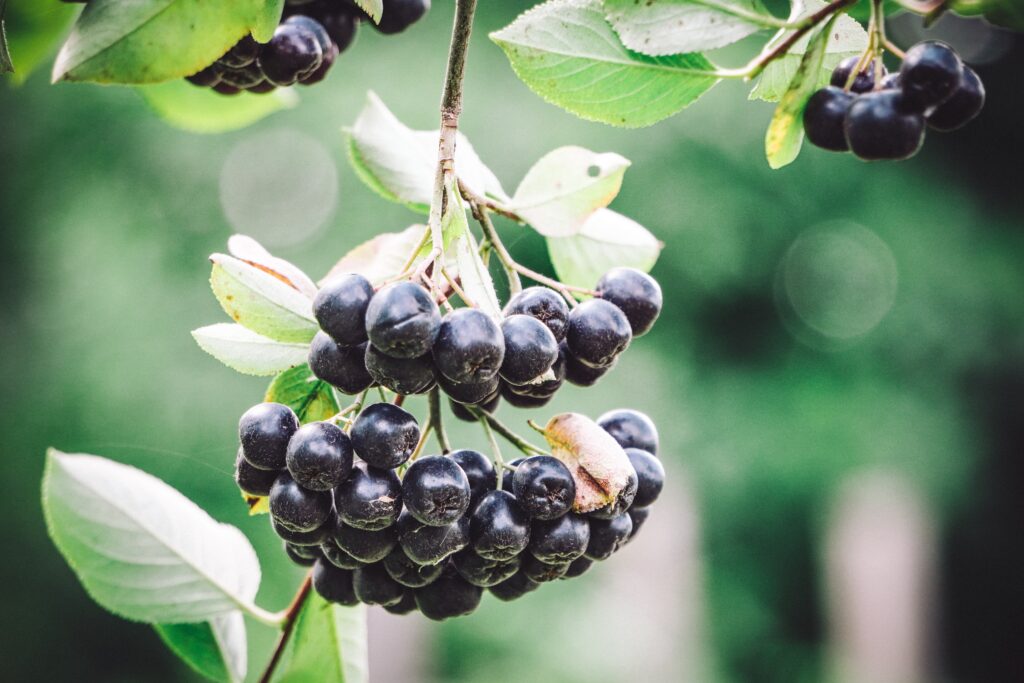Aronia Extract
Dr. med. Heinz Lüscher
The chokeberry (Aronia melanocarpa) has it all! It trumps with a sensationally high content of antioxidants, which gives it an incredible health potential.
Origin of the Aronia Berry
The chokeberry (Aronia melanocarpa) originally grew wild in the USA, but has been cultivated in Europe, including Switzerland, for several years. The plant grows like a bush and can grow to a height of two to three metres. It is extremely hardy and frugal and does not require any pesticides. What is really astonishing, however, is the enormous health potential of these berries, which are not very noticeable both visually and in taste!
Aronia berries in the video
Learn more about the chokeberry and the vital substances it contains in the video with Dr. Heinz Lüscher.
The chokeberry the superfood!
Chokeberries have long attracted the attention of complementary medicine because of the high content of polyphenols. These belong to the secondary plant substances, which have numerous positive effects on health.
Secondary plant substances (Phytochemicals)
Secondary plant substances occur exclusively in plants and are found, for example, in the marginal layers of fruits, vegetables and berries. They are a large group of color, fragrance and aroma substances. They have functions such as attracting insects, but also repelling predators or microbial attack. In addition, they act as growth regulators.
In the human body, secondary plant compounds exert a positive influence on a variety of metabolic processes and many health-promoting effects can be attributed to them.
Polyphenols
Polyphenols act in the body, among other things, antioxidant, anti-inflammatory, support the immune system and cardiovascular system and reduce the risk of certain types of cancer. The total content of polyphenols in chokeberries is 10-20 g/kg (study University of Illinois), which is much higher than in raspberries, strawberries or blueberries.
More than 200 studies prove the connection between the intake of more berries, fruits and vegetables (in organic quality) and the decrease of cardiovascular diseases and cancer. Individuals of these studies have been published in prestigious medical journals and yet most doctors do not pay attention to them.

Chokeberries contains a gratifyingly high polyphenol content (e.g. flavonoids such as cyanidin and quercetin glycosides), as well as chlorogenic acids and various important vitamins and minerals. This explains the many amazing feedbacks on improvements in a wide range of health problems.

Antioxidants
The main effect of chokeberry is based on the high content of antioxidants, which make it the superfood with the highest ORAC value (measure of antioxidant capacity).

What are antioxidants?
An antioxidant, also known as a free radical scavenger, can interrupt the chain reactions of free radicals and thus prevent cell damage and thus diseases. Free radicals are oxygen-containing molecules that are dangerously unstable because they lack an electron in their chemical structure. In their “search” for the missing electron, free radicals are extremely aggressive. The next best intact molecule in the body is simply “robbed” of the required electron. This “electron theft” is called oxidation. If the oxidations in the body’s cells exceed a tolerable level, so-called oxidative stress occurs. The cells are damaged, which can lead to various diseases. This is where the antioxidants come into play, because they release one of their electrons “voluntarily” and thus protect the cells.
Ingredients of chokeberry:
- 85% Water
- 12% glucose and fructose
- All vitamins except B12 and D, most
- vitamin C and vitamin K
- Folic acid
- 0,7% Protein
- Polyphenols / flavanoids
- Carotenoids
- Sodium
- Potassium
- Calcium
- Magnesium
- Sulphur
- Iodine
- Copper
- Manganese
- Zinc
- Iron
Suitable products
When buying a dietary supplement with chokeberry, make sure you get a high quality product. I recommend a highly concentrated chokeberry extract, which contains a polyphenol value between 5 and 7.5%.
Chokeberry can have a preventive or curative effect on the following diseases (selection):
- Allergies such as hay fever
- Chronic inflammatory diseases such as arthritis
- Tiredness, exhaustion, lack of concentration
- Menstrual cramps, climacteric complaints
Selected studies on chokeberry
- The clinical effectiveness of chokeberry: a systematic review
- Current knowledge of Aronia melanocarpa as a medicinal plant
- Bioavailability and Antioxidant Activity of Black Chokeberry (Aronia melanocarpa) Polyphenols: in vitro and in vivo Evidences and Possible Mechanisms of Action: A Review
- The multifunctionality of berries toward blood platelets and the role of berry phenolics in cardiovascular disorders
- Effects of polyphenol-rich extract from berries of Aronia melanocarpa on the markers of oxidative stress and blood platelet activation
- Extracts, anthocyanins and procyanidins from Aronia melanocarpa as radical scavengers and enzyme inhibitors
- Aronia melanocarpa extract reduces blood pressure, serum endothelin, lipid, and oxidative stress marker levels in patients with metabolic syndrome
- Aronia melanocarpa fruit extract exhibits anti-inflammatory activity in human aortic endothelial cells
- Aronia melanocarpa and its components demonstrate antiviral activity against influenza viruses
